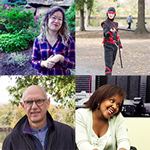Faces Behind the Screen: Crystal
Quick Links
<< Return to all “Faces Behind the Screen” stories
Our Faces Behind the Screen project began in a small conference room at Boston University. Crystal, the Assistant Director for the Student Activities Office at BU, was one of the first interviewees to participate.
In her role at the university, Crystal manages student events and works with student organizations on campus to ensure everyone stays safe while having fun.
Crystal is Deaf, and while she is fluent in English, she communicates primarily in American Sign Language (ASL) for in-person interactions.
Below is a video from our interview with Crystal in which she signed her responses. The text in this story is transcribed from her interpreter’s voice:
What do you enjoy most about being a part of students’ development at such a key point in their lives?
I really want to make a difference in the lives of students.
And it may sound a little cheesy, but it is true. It’s something that I have a passion for. I really enjoy that interface, whether it be Deaf or hard of hearing or non-Deaf students. That doesn’t matter to me. It’s just the importance of making a difference because of who I am, because of the story I bring to the table.
And I’m just motivated to be in their lives, because there’s so much potential that you can see in new students. They learn from you. You learn from them. It’s a very reciprocal relationship, and I think it’s the best way for me to make an impact, a direct impact. And to see students develop and grow is quite nice.
“Communication, by the very nature of it, is a difficult thing. You can’t really go in a straight line, A to B. Things have to kind of go in a curvy motion to get to your ultimate goal.”
What is it like working with students who are not used to communicating with people who are Deaf?
Communication, by the very nature of it, is a difficult thing. You can’t really go in a straight line, A to B. Things have to kind of go in a curvy motion to get to your ultimate goal. So, there are certainly some struggles in how students communicate with me, because I don’t have interpreters with me at all times. So we have to make do.
[…] It’s also pretty cool to see [how] students really are able to understand that communication is important — and clarity — that things can certainly get lost in translation. Being able to understand that you need to take a moment and pause… I think it’s a good experience for both parties because I’m not used to having interpreters with me all the time. And I’m used to figuring out things on my own.What is it like relying on sign-language interpreters to communicate with others?
“It’s tough because sometimes I feel like I just want to say it.”
Well, to have someone interpret for me requires an awful lot of trust. An immense amount of trust. Sometimes I feel like I just want to push that interpreter out of the way and do it myself.
You can’t sign? Okay, that means then I have to utilize an interpreter. It’s tough because sometimes I feel like I just want to say it. I just want to take it over and communicate directly and ensure that my needs are being met. But going through the interpreter requires a lot of faith in their interpreting skills.
So, how I feel about it? I’m going to be honest. It sucks, but I’m used to it. It is kind of how it is. How else can I get my message across? I don’t really have much of a choice.
…It’s funny that interpreters are able to pick up my personality and represent tone, reflect who I am, and that I can appear through their voices, which [means it] is quite important to find the right interpreter that matches, because I want people to see who I am and follow my facial expressions and choose the appropriate terms and language.
Imagine receiving a phone call from me… You’d want to be able to visualize what I look like. And I don’t want people to have an altered sense of who I am because my interpreters aren’t able to reflect to me properly.
How does technology impact your ability to communicate people in general?
I feel like it’s a catch-22, technology.
Technology is great. There’s obviously more access. I can call and make a doctor’s appointment. I can get my business done. And you don’t have to rely on anyone for that, which is quite nice. On the other hand, it has certainly affected the Deaf Community.
More specifically, I think that it’s caused more instances of isolation. We have FaceTime. We have video phones. We have internet and social media. You can connect with people far away. So, people don’t get together face to face anymore, as they used to. And I find that to be a detriment.
What is it like for you watching videos on the internet?
Most videos are not accessible. For example, social media: Instagram doesn’t have any captions or even an ability. I mean, videos can look pretty cool, but I don’t know what people are saying.
YouTube — it’s a good start. They’ve taken some good steps.
But it’s this [automatic captioning] software — that seems pretty cool, but it’s not always accurate. Very often, it’s not. It’s nice to see that we’re getting there, you know, step one. […] It’s a nice first step. But it doesn’t capture the true essence, the tone, language, the nuance.
“Stop trying to fix us as the Deaf Community.”
What is one thing you wish you could change about the world?
[I wish people would] stop trying to fix us as the Deaf Community. There’s panic around the idea of people who can’t hear. And if you are able to use technology to, quote-unquote, “fix” people, that’s not always the solution.Also, I wish people were more open-minded, were more willing to meet halfway, to accept differences. Accessibility is one of the biggest parts of what makes things work for people. Accepting the idea of accessibility — that looks different for everybody.
For example, people communicate differently. They look different. They act differently. We live our lives differently. But there’s nothing wrong with difference. Being unique is fun. It’s a learning experience. I think that there’s opportunity out there that people are passing by for the very nature of being afraid and expecting standardization.
And that’s why I’m grateful that my boss was able to give me the opportunity for this job. He saw the potential in me as a co-worker to make a difference in his department here at BU. He didn’t have to follow the standard. It’s kind of a curveball, if you will. He took a leap of faith in me and figured it was worth seeing how it would play out. And so I wish that the world could view things and take on differences and actually think that different is the norm.
—
NOTE: This page was originally published on 1/24/2017 and was updated 1/12/2018.
We want to extend a huge thank you to Boston University and the Howard Thurman Center for Common Ground for hosting this series of interviews.
Faces Behind the Screen is a storytelling project focusing on members of the Deaf and hard of hearing community.





